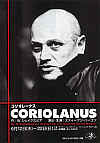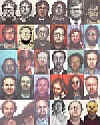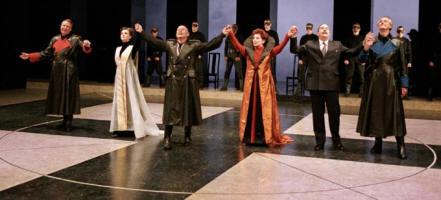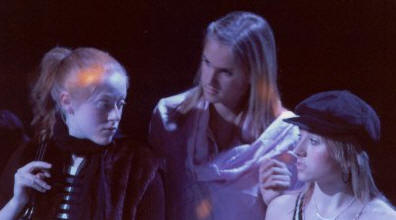|
home
more |
Click on the images below for links
to the plays and reviews |
||
 |
Coriolanus Frank Rich, New York Times, 5 Feb 1989
'"...
marked by a wholesale disregard for the text. Mr. Berkoff
took large cuts, wrote lines of his own, and set the
cast, led by a swaggering Christopher Walken, to
boogeying about in the martial ''West Side Story'' style
in which he directs his own plays in London. The result
was a scabrous diatribe about the futility of politics -
not Shakespeare's show exactly, but one that spoke to
American audiences disillusioned by the election
campaign. And despite the tyranny of the director's
staging conceits, the acting was generally above the
Shakespeare Festival average." |
||
 |
Coriolanus June 1996 Photos from the Berkoff production. Recommended.
|
||
|
|
Coriolanus American Theatre, March, 1989 No current
director utilizes ritualized, Greek-choral staging better
than Berkoff. With slight changes of wardrobe and
occasional half-masks, on a set consistsing exclusively
of 12 black lacquered chairs, the male ensemble
efficiently plays the Roman senate and the Volscians as
well as the Roman plebes -- economically underscoring,
perhaps, Coriolanus's uniformly willful resistance to
them all. And the completely non-naturalistic fight
scenes churn up an energy that is purely theatrical:
Without weapons or props, the soldiers engage in
hand-to-hand combat to an agitated drumbeat, which halts
abruptly for pauses filled with choreographed panting. |
||
 |
Coriolanus
(link is down) It has taken the
critical establishment over twenty years to come to terms
with Steven Berkoff's vigorous and highly original (in
Western terms at least) approach to putting on plays. The
irony is that his style is derived from the most ancient
theatres there are. Based on classical Greek models and
traditional theatrical forms from all over the world,
Berkoff's theatre is one where meaning is conveyed as
much by movement, action and attitude as by words.
("Words", he once said, "can be too
precious in the theatre.") From his early training
in mime, Berkoff has always been excited by the
possibilities to be found in the interplay between
ensemble and chorus, and throughout his work - and not
least in the production of Coriolanus -this combination
has consistently added to the bare text a further
dimension of vital, physical expressiveness. |
||
 |
Coriolanus
(link is down) Coriolanus's Rome is suggested by a row of imposing pillars and black chairs while the monochrome costumes mix totalitarian chic, business wear and a dash of fetishism. The ruling patricians act sometimes like Nazis, sometimes like mafia dons, but always with distaste for the ragged commoners. In this sneering, abrasive Coriolanus is like a lighted match held to a petrol can. The result is everything you would expect from
a man whose name has achieved adjectival status: an
atmosphere-laden extravaganza dominated by stylised
movement and arresting visual images. |
||
 |
Coriolanus Ian Shuttleworth His verbal violence may be over-compensation for its physical counterpart. Whisper it softly, but the lad's beginning to knock on a bit for this lark. In battle scenes, as the ensemble lurch and mangle the air with the best of them, Berkoff looks uncomfortable even with the occasional boot-boy high-kick. For a ferocious general who can subjugate entire towns single-handedly, this is something of a drawback. Fifteen or even ten years ago, he would have exuded the desired physical menace seemingly without effort. The effort is now too visible. The production is also hampered by his
directorial exuberance. It's nothing new to say that he
doesn't know when to stop, and in his original works and
adaptations that instinct to fill every moment of
performance is often one of his major assets. Here it
fights against the script. De-emphasising the words is
all very well, until one begins devaluing them. |
||
|
|
Decadence
(film) David Nicholson 1999 [Joan Collins] and Berkoff first met on the TV series Sins and he says he fixed on her for this role many years ago. “I was a little taken aback when I first read the script,” she remembers. “I thought it would be terribly difficult to do and I didn’t really see myself in it. But Steven came over to my flat and read it through with me and I got a tiny inkling of how it would work.” ...The crew themselves maintain that Berkoff,
the novice director, has found it hard to deal with
tracks, laid for travelling shots and the complexities of
film lighting. He has no training in these disciplines,
but after 18 days’ shooting, director and crew had
become reconciled, uniting against their common enemies:
time and money. |
||
 |
Decadence theoxfordstudent, Simon Thomas, 2006
Berkoff
uses expletives as often as other playwrights use verbs
— but behind this is a subtle interplay of class and
personality. Did I say subtle? Sorry. Subtle, Berkoff is
not. He chooses rather easy targets — racists,
the upper class, upper class racists — and is not
shy in depicting the sexual potential of horse-riding. It
feels on occasion as though one has accidentally wandered
into a fetishist’s most immoral fantasies. The play
has only four characters: Steve, who is having an affair
with Helen, is married to Sybil, who hires private
investigator Les to check up on Steve. Confused? It gets
more complex — the cast consists of only two
members... Little could salvage Berkoff’s
self-indulgent script, but the team behind this
production have achieved the difficult and made this a
play worth seeing. Just do not take your grandmother. |
||
 |
Dahling you were marvellous TEW, 1985
|
||
|
|
Dahling you were marvellous (link is down) Arts Network Swansea This
play, set in a watering hole catering for the theatrical
chattering set, the play follows an evening after a first
night, where outrageous flattery and deceit rage. |
||
 |
Dog Bruce Weber, New York Times, 4 Feb 2002 In ''Dog'' Mr. Berkoff, wearing an astonishingly unattractive shirt with a Union Jack on it, does a marvelous anthropomorphic pit bull -- Roy is his name -- growling, mumbling curses and panting impatiently in an effort to hold back a snarling anger. Most of ''Dog,'' though, is devoted to Roy's master, a hopped-up, twistedly vulgar, pub-crawling galoot who shows his love for Roy by teasing him unmercifully and feeding him pub snacks with the cellophane wrappers still on them: |
||

